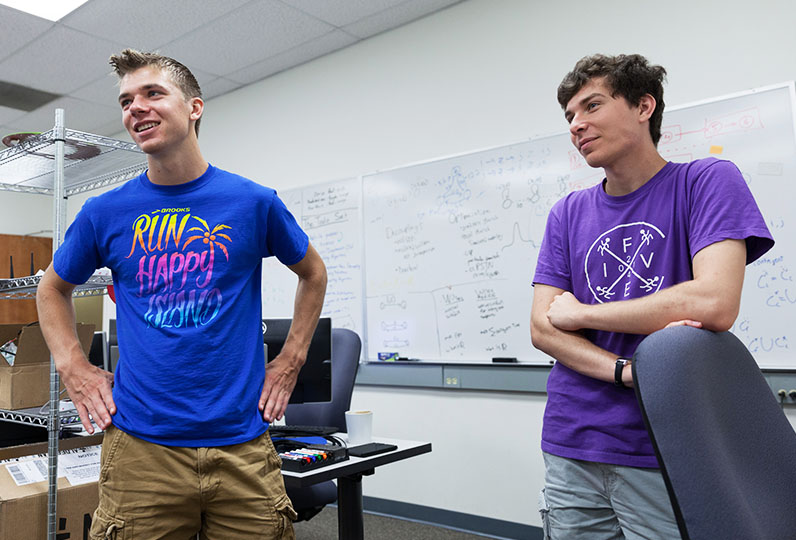Students’ Research on Robot Collaboration Accepted at AAAI-17
November 17, 2016
Harvey Mudd students Scott Chow ’17 (computer science), Sam Dietrich ’17 (engineering) and Kyle Lund ’17 (robotics IPS) and computer science Professor Jim Boerkoel will present their paper, “Robust Execution of Probabilistic Temporal Plans,” at AAAI-17, the Association for the Advancement of Artificial Intelligence (AAAI) Conference in San Francisco, Feb. 4–9, 2017.
The students’ paper considers scheduling scenarios in which robots must collaborate to complete a task (e.g., teams of robots autonomously navigating a warehouse to fetch and deliver items in order to fulfill online merchandise orders). The students developed algorithms for finding plans that are more likely to be successful.
The work stems from a summer 2015 research project, and, typical of research of this kind, it went through many iterations and revisions before it was finally accepted for publication. The team persisted in finding opportunities to get feedback, which included submitting the work to several top international AI/robotics conferences and presenting versions of the work at various venues. Boerkoel says, “By sticking with it, they were able to put together one of the strongest set of reviews I’ve ever seen for a paper at AAAI either as an author or reviewer.”
The Harvey Mudd students faced strong competition, with a record 2,590 submissions and only 638 papers accepted, for an acceptance rate of below 25 percent. AAAI is a nonprofit scientific society devoted to advancing the scientific understanding of the mechanisms underlying thought and intelligent behavior and their embodiment in machines. The AAAI conference promotes research in artificial intelligence (AI) and scientific exchange among AI researchers, practitioners, scientists and engineers in affiliated disciplines.
“I am particularly proud of Kyle, Sam and Scott,” says Boerkoel, assistant professor of computer science and director of HEATlab, which seeks to create new techniques for human-robot teaming—the flexible navigation and coordination of complex, interrelated activities in shared spaces. To this end, the lab members are working on several projects, including one called Robot Brunch, upon which the AAAI conference paper is based, which explores what it takes for multiple robots to schedule robust interactions in the messiness of the real world.
